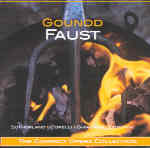Is it possible for a version of Gounod’s Faust to satisfy if its principals are innocent of traditional French style and replace clear diction with a mélange of accents? On the basis of this oft-reissued 1966 Decca recording, the answer is a qualified–very qualified–yes. There’s nothing quite like the conviction native French speakers schooled in the tradition of 19th-century Romantic French opera bring to the score. But such creatures are all but extinct, so we have to replace our expectations with healthy voices capable of doing justice to the opera. Decca certainly has those singers here, but even with relaxed standards it’s questionable whether their singing, thrilling as it often is, does justice to Faust.
In the title role Franco Corelli sounds terrific, the voice full of power and color. But he also sounds as if he wandered in from an Italian verismo opera where his strength and muscular projection would be more appropriate. The Méphistophélès, Nicolai Ghiaurov, substitutes broad, near-buffo excesses for the suave elegance of his bel canto predecessors. The Marguerite is Joan Sutherland, and as we expect from her, we get a healthy measure of droopy dragging but also flawlessly executed trills in the Jewel Song and a big, juicy voice that blooms in the big moments. The Valentin and Siebel, Robert Massard and Margreta Elkins, are fine, and Richard Bonynge’s conducting has flashes of real brilliance. Many of the choruses and big moments have the propulsion and energy they need, the Act 3 ballet has a nice light touch, and the more dramatic scenes go with welcome drive. But Bonynge is a co-conspirator with Sutherland in making some of her scenes spongy.
Barring occasional graininess, the sound is as good as anything we get these days, or it would be if the opera had not been recorded at a time when Decca was trying to simulate stage movement, so singers are distanced at times, only to emerge in close-up a few moments later. For example, in Faust’s opening soliloquy Corelli is buried far to the rear for four minutes, after which he emerges to the stage apron and belts it out. But for all its flaws, the Faust field isn’t exactly crowded with standouts, and few competitors offer the pure vocal thrills provided by Corelli and Sutherland. Many of us would gladly exchange a stylistically correct performance with good singers for an unidiomatic version such as this one with great singers at the peak of their powers. Decca’s booklet contains track information and a cogent plot synopsis by Julian Budden, but accessing text and translations can only be done by inserting the “enhanced CD” disc into your computer. This gives rise to one of the strangest lines I’ve ever encountered in a CD or LP set: “To magnify the libretto while viewing, press escape and use the magnifying tool.”
































